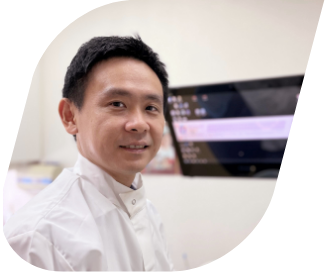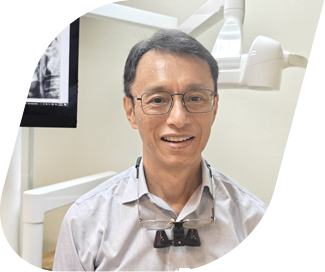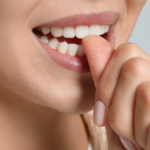Dental Veneers in Singapore
Book a 45-minute consultation with our Prosthodontists in Singapore to get started on transforming your smile with dental veneers.
Natural-looking dental veneers that transform your smile.
Or call: +65 6734 9393

What Are Dental Veneers
Dental veneers are thin, custom-made porcelain shells that can improve your teeth’ colour, shape and position. A dental veneer can also be used to restore the look of a broken or chipped tooth and sometimes to close gaps between teeth. Dental veneers fit discreetly over the surface of your teeth, much like false fingernails fit over your own nails. With their natural appearance, dental veneers are almost indistinguishable from real teeth, making them a popular choice among Hollywood stars to achieve a dazzling smile.
Types of Dental Veneers in Singapore
There are two primary types of dental veneers to choose from. When considering dental veneers, it’s essential to consult a dental specialist or prosthodontist to determine the best option for your specific needs.
Porcelain Dental Veneers
Porcelain veneers are crafted from durable ceramic. They are custom-made, thin shells that closely resemble the natural appearance of tooth enamel and are tailored to fit the contour, colour, and translucency of your natural teeth.
Pros:
- High resistance to staining, and maintain their colour over time.
- Realistic and mimics the natural tooth.
- Lasts between 10 to 15 years with proper dental care.
Cons:
- Porcelain veneers can cost between S$2,600 – S$3,200 per tooth due to the material and craftsmanship involved.
- Multiple dental appointments are required for a complete fitting.
- The application process is longer.
- It’s an irreversible procedure as it involves the removal of tooth enamel.
- When damaged, they must be entirely replaced.
Composite Dental Veneers
Composite veneers are made from a tooth-coloured resin material that is applied and shaped directly on your teeth.
Pros:
- Convenient and time-saving, often requiring just one visit to a dental clinic.
- Composite veneers are relatively more affordable than porcelain veneers.
- It is minimally invasive and reversible as enamel removal is not always required.
- Damage can be easily repaired, extending the life of the veneers.
Cons:
- Prone to staining and discolouration over time.
- It is less durable than porcelain veneers.
Both types offer a path to a brighter smile, and your chosen dental specialist in Singapore will be able to advise on the option that suits your needs, lifestyle, and budget.
Who Should Get Dental Veneers
If you’re unhappy with your teeth’s appearance, dental veneers might be a suitable choice for you. Here are the common issues that dental veneers can address:
- chipped or broken teeth
- discoloured or stained teeth that do not respond to whitening treatments
- gaps between teeth
- misaligned or unevenly shaped teeth
- worn down teeth
- desire for a more uniform and aesthetically pleasing smile
However, to be a good candidate for the procedure, you will have to meet the following criteria:
- Good overall oral and gum health, free from periodontal diseases and with a sufficient amount of enamel.
- Have fairly straight teeth, as severe misalignment could place excess stress on the veneers, risking damage.
- Not prone to night-time teeth grinding or clenching; these habits can damage the veneers over time.
Dental Veneers Treatment Process
During the initial stage, the veneer dental specialist evaluates your dental health, discusses your aesthetic goals, and determines if veneers are suitable for you. This session includes answering your questions and providing a detailed explanation of the procedure.
The next step is preparing your teeth. The dentist reshapes the surface by removing a small amount of enamel. An impression of your teeth will then be made. The colour of your surrounding teeth will be matched on a shade guide to make sure a natural look.
Before the veneer is permanently cemented to your tooth, your dental specialist will check to see if the colour and fit are suitable and make any necessary adjustments to achieve the proper fit.
Next, your tooth will be cleaned, polished, and etched to prepare it for a strong bonding process. Then, a special adhesive is used to bond the veneer to the tooth. A light is applied to the veneer, which activates the cement to cure and bond the veneer in place. Thereafter, final adjustments, if necessary, are made.
The entire treatment can be completed in 4 to 5 days and will involve about 2 to 3 visits.
Depending on the situation, you may be required to return for a follow-up visit at your chosen dental clinic in Singapore to ensure that the veneers, your gums and teeth are doing well.
Veneer teeth are no stronger or weaker than your natural teeth. However, veneers will last longer with a proper home care oral regime and regular professional maintenance every 6 months. Research has shown that veneers can last up to 10 to 15 years, and the success rate for veneers is about 85% over 10 years. This means that out of 100 veneer procedures done, about 15 of them need to be repaired or done again.
To maximise the longevity of your veneers, be mindful of eating certain foods or engaging in certain habits:
- Hard Foods and Chewy Meat: Food like hard candies, tough cuts like steak and certain raw fruits and vegetables, like apples and carrots, can damage the veneers. It’s advisable to cut the food into small, manageable pieces and chew with your molar.
- Alcohol: Alcohol can weaken the adhesive that holds your veneers in place, potentially leading to damage, so limit your consumption.
- Dark-Coloured Drinks: Tea, coffee, cola, and red wine will stain your veneers. As such, consider using a straw to minimise contact with the veneers or clean your teeth shortly after consumption to reduce the risk of staining.
Cigarette: Smoking or chewing tobacco should be avoided as it can weaken the bonding of the veneers over time and cause discolouration.
Dental Veneers Fee in Singapore
At Specialist Dental Group, the cost of dental veneers ranges from S$2,500 to S$3,000 per tooth. Additionally, other costs include a consultation and examination fee ranging from S$80 to S$200, and a digital X-ray fee of S$160. Several factors that may affect the cost of veneers include:
- The type of material used for the veneers
- The complexity of the dental work required
- The number of veneers needed
- The expertise and experience of the dentist
Please note: Medisave does not apply to veneer treatment. For more information, please visit our Medisave page.
Other fees
For sedation, there will be an additional fee for an anaesthesiologist to administer the sedation, which is about S$900 to $1,000 per hour.
Meet Our Prosthodontists
Our prosthodontic team is dedicated to keeping that brilliant smile of yours ever glowing.
Frequently Asked Question
Are there any alternatives to wearing braces if I want to get my teeth straightened faster?
Orthodontic treatment typically requires 12 to 24 months to complete.
Alternatively, veneers may be considered if one is unable to attend regular sessions over 12 to 24 months at the dentist. The entire process takes only a few days to complete.
Which teeth do you put veneers on?
Veneers are typically applied to the front teeth, particularly the upper ones, rather than the back teeth. This is mainly because they are noticeable when you smile or speak. Additionally, the teeth at the back of your mouth endure greater force when you chew, leading to a higher likelihood of veneers in those areas getting damaged or dislodged.
Are veneers the same as dental crowns?
Veneers and crowns are not the same as they serve different purposes and differ in their application. Veneers are thin layers attached only to the front part of your tooth, primarily for cosmetic enhancement. They are subtler at the gum line, making them visually appealing. In contrast, crowns are thicker and relatively durable compared to veneers. They encapsulate the entire tooth and are used for extensive restorations.
Can teeth veneers be removed?
Dental veneers are permanently affixed to your teeth, and attempting to remove veneers on your own can cause serious damage to your teeth or gums, possibly necessitating a root canal treatment. As such, it is recommended that you consult a dentist in Singapore with the right tools and professional training to remove your veneers without harming your teeth or gums.
Are dental veneers painful?
Most patients experience no pain during the procedure once the anaesthesia kicks in. It’s not unusual, however, to experience mild sensitivity or discomfort after getting veneers placed. Nonetheless, each person’s reaction varies, and such sensations usually diminish within a couple of weeks. To minimise discomfort post-procedure, you can consume room temperature beverages and temporarily avoid hard, spicy foods that can irritate your teeth and gums.












